- Home
- Dave Gross
Pathfinder Tales- Lord of Runes
Pathfinder Tales- Lord of Runes Read online
The author and publisher have provided this e-book to you without Digital Rights Management software (DRM) applied so that you can enjoy reading it on your personal devices. This e-book is for your personal use only. You may not print or post this e-book, or make this e-book publicly available in any way. You may not copy, reproduce, or upload this e-book, other than to read it on one of your personal devices.
Copyright infringement is against the law. If you believe the copy of this e-book you are reading infringes on the author’s copyright, please notify the publisher at: us.macmillanusa.com/piracy.
Contents
Title Page
Copyright Notice
Dedication
Inner Sea Region Map
Story Locations Map
1: The Acadamae
2: Old Korvosa
3: The Fencing Academy
4: The Laboratory
5: Upslope House
6: Thief Camp
7: The Dawn Shadow Path
8: Kaer Maga
9: The Therassic Spire
10: Tarheel Promenade
11: The Bottoms
12: The Cinderlands
13: The Sleeper
14: The Dragon’s Lair
15: The River of Souls
16: The Shadows of Xin-Gastash
17: The Shrine of Lissala
18: Seraph’s Ladder
19: The Cenotaph
20: The Crypt of Zutha
Epilogue: Vigil
Radovan
Acknowledgments
Glossary
The Pathfinder Tales Library
About the Author
Copyright
For Jen Laface, first reader, ringleader, and friend.
1
The Acadamae
Varian
Radovan had placed seven pebbles on the sundial between the shadow and the next hour. As darkness covered the next tiny stone, he flicked it away. It skittered across the plaza, narrowly missing the toes of a woman hurrying east. By her well-made dress of common cloth, the basket trailing a few errant threads, and the distinctive callus on her finger, I took her for a seamstress. She frowned at Radovan. He offered her a wink and the smirk he refers to as “the little smile.” She turned away an instant too late to conceal her own smile.
“A servant will bring me the keys at any moment,” I said. “Go.”
Radovan stretched, pointing his wicked elbow spurs at the sky. His red leather jacket hung loose on his broad shoulders. The tongue of his belt lolled out from the tighter cinch. In the months it had taken us to reach Korvosa, I estimated he had lost seventeen pounds. He nodded toward the gate. “I don’t like the way those guys are looking at you.”
I turned to see a trio of students emerging from the Acadamae, the girls laughing at the boy’s quip. I could only presume that Radovan referred to the hellspawn guarding the gate. The devil-blooded sentries were notorious throughout Korvosa for abusing students and visitors alike.
One of the guards snarled as the students emerged. “What’s so damned funny?”
Unlike Radovan, who boasted he could pass in dim light so long as he avoided the “big smile,” these hellspawn would never be mistaken for human. One had vestigial gills and an eel’s snout; the other could barely see out from beneath a pair of coiling horns.
The students lowered their heads and hastened past. The horned hellspawn whistled after them. The other turned toward me. His piscine eyes lingered on the sword on my hip and the Ustalavic wolfhound at my heel. He weighed the danger and looked away.
Suppressing a smug smile, I turned to Radovan. “As you can see, ‘those guys’ know better than to menace a count of Cheliax.”
“Not those guys,” said Radovan. He plucked another pebble from the sundial and made a catapult of his thumb and middle finger. He aimed at the top of the gate. “Those guys.”
A spotted raven, a chimera cat, and a potbellied imp peered down at us.
“Radovan, it would be prudent not to—”
Radovan flicked the stone. The half-black, half-orange cat shrieked and fled along the wall. The raven flew into the safety of the Acadamae grounds, but the devil flew toward us, cursing in the guttural tongue of Hell. It demonstrated an impressive vocabulary and a flair for simile.
“That cat might have been a professor’s familiar,” I said. I drew the Shadowless Sword and plucked a riffle scroll from my pocket. “Or, worse, a master’s.”
Radovan shrugged, but I saw by his posture he was prepared to produce a razor-sharp throwing dart or star from one of the many secret pockets in his jacket sleeves. “I was aiming for the imp.”
Hovering just beyond reach of my blade, the devil hissed, revealing a mouth full of needle-sharp fangs. Radovan hissed back through his big smile, revealing a jumble of teeth a Mendevian general once compared to a demon’s armory.
The imp peeped and flew after its cohorts.
Radovan popped his jaw back into joint. He turned to see where the seamstress had gone.
“Go.”
“You don’t mind if I take the night?”
“Look for me at Upslope House tomorrow. I will return there after I finish cataloging Ygresta’s library.”
“You got too many books already.”
“One can never have too many books. Still, I doubt I shall find any worth keeping. Just strive to remain inconspicuous. Stay out of Thief Camp and Old Korvosa.”
“Old Korvosa, huh?”
I should have known better than to present Radovan with a forbiddance. By naming the two districts I most wished him to avoid, I practically ensured he would visit them. “The important thing is to avoid Chelish attention. The moment I receive the queen’s summons, I am duty-bound to return home.”
Thanks to warnings from military friends in Sarkoris, I had thus far avoided the heralds of Her Infernal Majestrix. I knew what message they must carry: Queen Abrogail would demand to know why I sent her a copy of the Lexicon of Paradox rather than the original. I had prepared several excuses, but none would withstand a rigorous interrogation by the inquisitors of Asmodeus. How could I admit that I trusted the crusader queen of Mendev to use the book for the good of all Avistan? How could I conceal my fervent belief that the queen of Cheliax would use it only to further her own power? One sharp question was all it would take to condemn me to impalement upon the tines.
Self-preservation was not my only motive for remaining abroad. What began as a self-imposed exile to escape scandal had become an adventure. Radovan and I had faced many horrors, and wonders too. Some came not from the fabled lands we visited but from within ourselves. One of the wonders—or horrors—within myself remained an unsolved mystery.
And I hoped to find the answer to that mystery soon, here at the Acadamae in Korvosa. Yet as Queen Abrogail’s impatience grew, it was only a matter of time before she instructed one of her sorcerers to contact me with a spell. There were ways to avoid such communication, but none I could safely explain to her inquisitors. When I received the summons, by writ or dream, I would answer.
“You’d think she’d cut you some slack now the war’s over,” Radovan said.
Despite the sun warming my shoulders, I felt a gloom. “The war is never over.”
“Come on, boss, lighten up. Take a picnic over to Jeggare Island. Go for a stroll around Jeggare Square. There’s a Jeggare Museum, isn’t there? You like museums. You like stuff named after you.”
“How many times must I tell you—?”
“Yeah, I know. They named those places for your uncle Monte.”
“Montlarion Jeggare the explorer, one of the esteemed founders of Korvosa, my accomplished great-great—”
Arnisant pr
icked up his ears at the sound of irritation in my voice. I patted his shoulder. A sly smile grew at the corner of Radovan’s mouth. He was trying to be amusing. As usual, he succeeded more at being trying than at being amusing.
“I just wish you could relax is all,” he said. “Ever since we hit town, you’ve been tense.”
“Tense” was too small a word for the vexation I felt since meeting with Toff Ornelos. What I sought from the headmaster was an explanation of why the Acadamae had failed to detect my magical bloodline, which I had discovered only recently. For reasons of their own, the proctors allowed me to engage in a futile struggle to master the science of wizardry when they should have turned me away to develop my innate talents under the tutelage of a sorcerer.
Instead of answers, what the headmaster gave me was news that one of my oldest friends had died having named me executor of his meager estate. Headmaster Ornelos would hear none of my complaints until I had dispensed with what he deemed the more urgent matter.
Yet none of that was Radovan’s fault. I looked him in the eye and said, “There is a park.”
“Huh?”
“Jeggare Green. It is a modest size, but Queen Domina dedicated it to me, not my ancestor.”
“‘Jeggare Green,’” Radovan mused. “I’ll look for it. If you’re all right, then I’m going to—” He jerked a thumb over his shoulder in the direction of the vanished seamstress.
“Go!”
Radovan departed at a jog.
I turned back to the hellspawn gatekeepers. They glowered but kept their tongues still. I wondered whether their caution had more to do with my sword or my hound. The Shadowless Sword was swift and Arnisant fearless, but the guards had more to fear from my spells—both those inscribed on the riffle scrolls concealed throughout my coat and those I could summon by force of will, now that I understood that I was a sorcerer rather than a wizard.
The guards turned at the approach of another student from inside the Acadamae grounds. Rather than taunt the woman, they bowed as she passed.
The hem of her skirt swirled about her ankles as she strode toward me with swift grace. Upon each hand she wore a jeweled ring, and around her throat a cameo on a black ribbon. Across her hips hung a plaited belt holding a pair of holstered wands and a tooled-leather pouch, to which she had pinned the silver Acadamae badge that granted her access to the campus. To my surprise, I could not estimate her age more precisely than mid-twenties to mid-thirties. Ordinarily I could make a guess accurate to within two years.
On impulse, I uttered a brief cantrip. The spell indicated powerful magic on the woman’s cameo, rings, pouch, and wands, but none on the woman herself.
“Count Varian Jeggare.” Her eyes registered surprise as she drew near. “Why, you look entirely rejuvenated, if a bit underfed. You must come to my father’s house and let us give you supper.”
Unable to recall her name, I bowed and fell back on a banal courtesy: “You are as lovely as ever, my lady.”
Her lips quirked—with pleasure or amusement, I could not tell. My inability to read her expression irked me.
My gaze slipped from the woman’s deep purple eyes to the cameo at her throat. Carved into the stone was an exquisite death’s head moth, its wings dappled in tawny shades fading to ivory.
“Did I see you cast a spell as I approached?” she said.
It was bad form to cast a spell on a fellow noble. “A minor divination, lady, nothing to violate your person. Forgive me. I must strive to shed my wartime habits.”
“No apology necessary. We are all grateful to those who held back the Worldwound demons. Besides, no one can cross the campus without being subjected to a few divinations, if not a transmutation when the upperclassmen feel prankish. I just didn’t think you could do that.”
“Do what?”
“Cast a spell.”
“Ah.” My disability was not a well-kept secret, but few were bold enough to mention it to my face.
With a gesture for me to follow, the woman led me through the gates. As we strolled along the gravel path, Arnisant snuffled at her shadow and growled.
“Arnisant, heel!” The hound returned to my side, his gaze locked on the lady’s feet. “I beg your pardon. He is usually better behaved. Perhaps he too must shake off the rude habits of war.”
The woman lifted her skirt a few inches and examined the soles of her boots. They were of a fashion popular decades earlier, one that I found uncommonly fetching. “Perhaps I stepped in something as I passed the conjurers.” She appraised Arnisant, who remained calm. “May I pet him?”
She showed no fear, so I nodded.
The hound remained still as a statue as she stroked the curly gray fur on his head. “What a handsome fellow. And what a fine name for him.”
Since I was in Ustalav when I found Arnisant, I named him for the famous general who martyred himself to defeat the Whispering Tyrant. “My grandfather always said, ‘Give a dog a good name.’”
“Because others will think you a brute if you call him ‘Fang’?”
“For that reason too, but also as a practical blessing. When you give a dog a brutal name, your tone grooms him to become a brutal animal each time you call to him. But a dog hears respect as well as scorn. Call him by a hero’s name, and he may become a hero himself.”
“In that case, Arnisant must be ready to give his life for you.”
That notion troubled me more than it ought, for I had grown fonder of Arnisant than of any other dog I had raised.
We continued our walk across campus. Plots of ornamental foliage provided a Chelish order to the grassy swards between the academic buildings. The spring flowers perfumed the grounds. A bell from the Hall of Summoning tolled the hour. Moments later, students spilled out to enjoy a few minutes outside before their next classes began.
“They look so young, don’t they?” said the woman beside me. Her smile should have seemed familiar, yet it did not. Still I could not place a name with her face.
In my memory library, the mental construct I have nurtured for nearly a century, I perused the gallery of every Korvosan aristocrat I had ever met. The woman’s black hair and purple eyes suggested she shared my mother’s Azlanti heritage, the rarest of bloodlines. She bore none of the other Jeggare features, which my father’s elven blood muted in me.
I nodded agreement and smiled before looking away, pretending to take in the scenery while wracking my memory for her identity. As we passed the statue of Acadamae founder Volshyenek Ornelos, I found a clue in his countenance.
I last met unfamiliar members of House Ornelos at the funeral of Fedele Ornelos, one of the finest men I ever had the privilege to call friend. After the memorials, I remained in Korvosa to attend to business. In the evenings I renewed old acquaintances and established new ones. Among the new were young scions of the noble families, including House Ornelos. Children seldom leave an impression on me, but I record their names and ages in my memory library nevertheless.
My escort was surely one of Fedele’s nieces, making her the grandniece of Toff Ornelos and thus accounting for the deference the hellspawn guards showed her. No doubt the headmaster had sent his grandniece to keep me and my hundred questions out of his office.
Arnisant woofed as a raven swooped near. Once more I drew the Shadowless Sword from its scabbard, but not to strike. In addition to its swiftness, the blade revealed the truth beneath any illusion. It revealed the raven’s true form as that of another imp.
“Don’t let them frighten you,” said the woman. “The familiars are worse bullies than the guards. Professor Ygresta had the right idea. Each term he would destroy one as an example to the others. They never harried him as they do some of the timid professors.”
The Shadowless Sword revealed no illusion on the woman. I put away my blade. “Was he not concerned he would kill a colleague’s familiar?”
“Oh, no,” she said. “He always summoned the imp himself.”
Her anecdote brought a nostalgic smile to
my lips.
“So it’s true he learned that custom from you?” she said.
“Not the idea of a warning demonstration, but I might have provided the inspiration.” Even before the rise of House Thrune, summoning a devil was a mandatory exercise at the Acadamae. There was no requirement to keep the fiend as a familiar, however, nor to let it free to torment the citizens of Korvosa, as so many reckless students do. Though the convulsions I suffered while casting the spell were agonizing, I gladly suffered them again to destroy the fiend after the proctors recorded my success. One less devil in Korvosa. One less inch of the world surrendered to Asmodeus.
As we passed the Hall of Whispers, a stench of boiling urine from the necromantic laboratories wet my eyes. I plucked a scented handkerchief from my sleeve and offered it to the lady.
She waved it away. “After four years among the cauldrons, I became quite immune to the stench.”
“Ah.” The significance of the moth on her cameo struck me. “You specialized in necromancy.”
“Your favorite subject.” Her tone indicated that she knew of my disdain for her specialty.
“Ah.”
“Ah.” She softened her mimicry with a smile. “Uncle Toff warned me that you despise necromancers, but I know that can’t be universally true. After all, Professor Ygresta was your friend.”
Despite our social disparity, Benigno Ygresta had been a friend of a sort. In fact, he had been perhaps my oldest living friend, although I had seldom seen him in the seven decades since we left the Acadamae. I decided not to mention that we first met when I hired the lowborn Ygresta as my bottle-washer, a menial job he gladly accepted to supplement his paltry income.
“You studied with Ygresta?” I asked.
“He was the one who persuaded me to join the Hall of Whispers. I’d always thought only ghouls and grave robbers would study the art, but he caught my attention by demonstrating the best spell I had ever seen. Eventually, his lectures on the ethical applications of necromancy won me over. His life-matter theory alone should have earned him distinction, if only he could have won over the masters.”
I nodded sadly, remembering one of Benigno Ygresta’s many shortcomings: he had little talent for the subtle politics of wizards, especially the more conservative masters of the Acadamae. “Ygresta always struggled to express his fancies as proofs the traditional necromancers could embrace.”

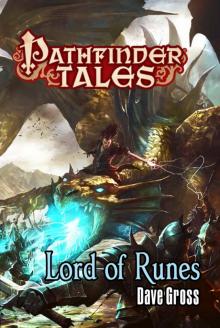 Pathfinder Tales- Lord of Runes
Pathfinder Tales- Lord of Runes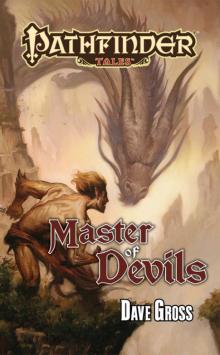 Master of Devils
Master of Devils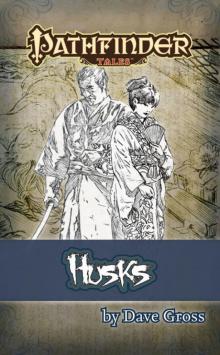 Husks
Husks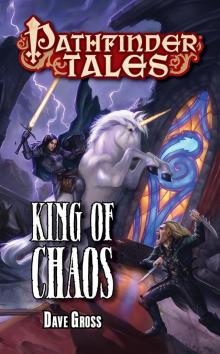 King of Chaos
King of Chaos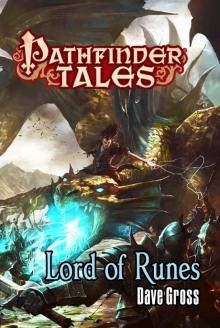 Pathfinder Tales: Lord of Runes
Pathfinder Tales: Lord of Runes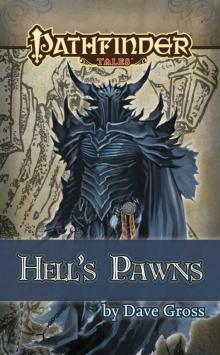 Hell's Pawns
Hell's Pawns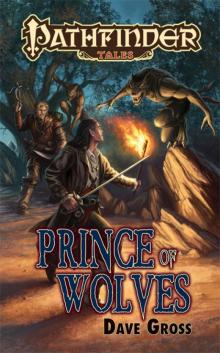 Prince of Wolves
Prince of Wolves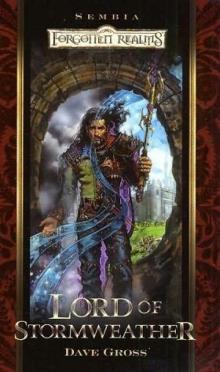 Lord of Stormweather fr-7
Lord of Stormweather fr-7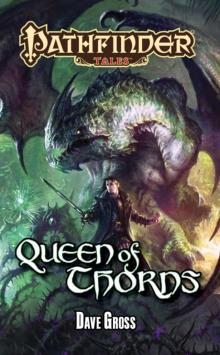 Queen of Thorns
Queen of Thorns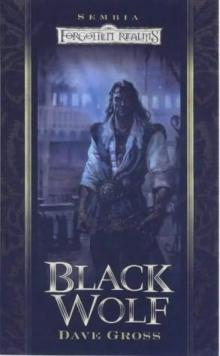 Black Wolf s-4
Black Wolf s-4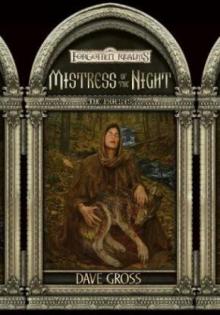 Mistress of the Night p-2
Mistress of the Night p-2